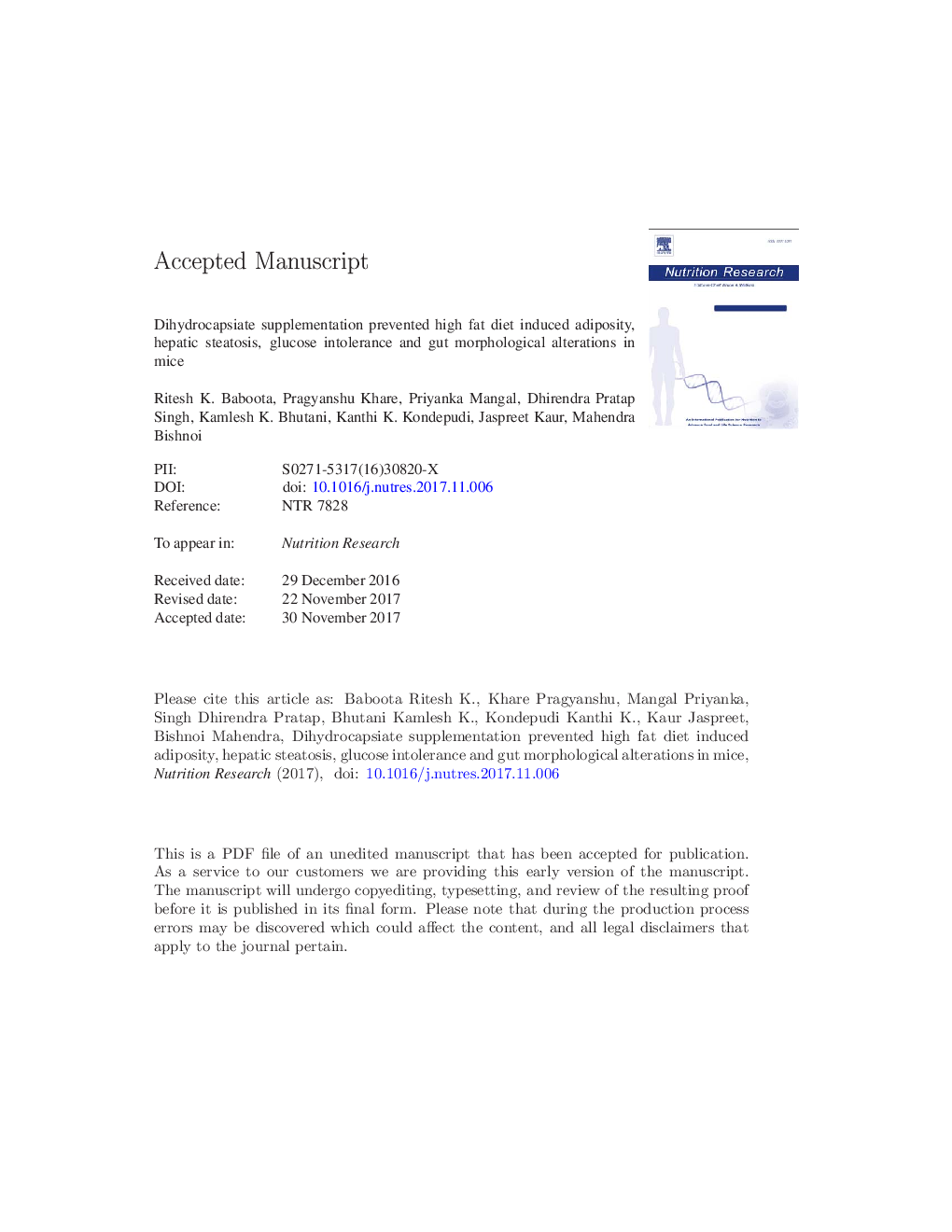| کد مقاله | کد نشریه | سال انتشار | مقاله انگلیسی | نسخه تمام متن |
|---|---|---|---|---|
| 8634250 | 1569094 | 2018 | 56 صفحه PDF | دانلود رایگان |
عنوان انگلیسی مقاله ISI
Dihydrocapsiate supplementation prevented high-fat diet-induced adiposity, hepatic steatosis, glucose intolerance, and gut morphological alterations in mice
ترجمه فارسی عنوان
مکمل دی هیدروکاپیسیته از چاقی با الکل با چربی بالا، استئاتوز کبدی، عدم تحمل گلوکز و تغییرات مورفولوژیکی روده در موش جلوگیری می کند
دانلود مقاله + سفارش ترجمه
دانلود مقاله ISI انگلیسی
رایگان برای ایرانیان
کلمات کلیدی
BATvWATNRFAINDlk1Dulbecco Modified Eagle MediumHFDSCFAPPARγPLIN1visceral white adipose tissuePGC1αACOX1FABP4acyl-CoA oxidase 1PPARαPEPCKTFAMLPSG6PaseTMEM26PBSAdipoTNFαERRαtranscription factor A, mitochondrialIL-6TRPV1DMEMPRDM16SREBP1FBSCCAAT/enhancer-binding protein betaperoxisome proliferator-activated receptor gamma coactivator 1-alpha - 1-آلفا کوآتیواتور گاما گیرنده فعال پرولیسینز فعالc/ebpβ - c / ebpβH&E - H & EUcp1 - UCP1adiponectin - آدیپونکتینperoxisome proliferator-activated receptor alpha - آلفای گیرنده پرولیفراتور فعال فعالHepatic steatosis - استئاتوز کبدیfatty acid synthase - اسید چرب سنتازshort-chain fatty acid - اسید چرب کوتاه مدتinterleukin 6 - اینترلوکین 6brown adipose tissue - بافت چربی قهوه ایANOVA - تحلیل واریانس Analysis of varianceELISA - تست الیزاEnzyme-linked immunosorbent assay - تست الیزاtumor necrosis factor alpha - تومور نکروز عامل آلفاPR domain containing 16 - دامنه PR حاوی 16high-fat diet - رژیم غذایی با چربی بالاfetal bovine serum - سرم جنین گاوbody mass index - شاخص توده بدنBMI - شاخص توده بدنیNuclear respiratory factor 1 - عامل تنفسی هسته ای 1Glucose intolerance - عدم تحمل گلوکزFasn - فسادphosphate buffer saline - فسفات بافر شورphosphoenolpyruvate carboxykinase - فسفوآنولپیرود کربوکسیکینازLIPE - لپهlipopolysaccharide - لیپوپلی ساکاریدObesity - مرض چاقیAmerican Institute of Nutrition - موسسه تغذیه ای آمریکاHematoxylin and Eosin - هماتوکسیلین و ائوزینfatty acid binding protein 4 - پروتئین اتصال دهنده اسید چرب 4sterol regulatory element-binding protein 1 - پروتئین اتصال دهنده عصاره استرول 1uncoupling protein 1 - پروتئین جدا سازی 1transmembrane protein 26 - پروتئین غشایی 26Perilipin 1 - پریلیپین 1Transient receptor potential channel - کانال بالقوه گیرنده گذراPeroxisome proliferator-activated receptor gamma - گاما گیرنده گیرنده فعال پرولیفیزوم فعالglucose 6-phosphatase - گلوکز 6-فسفاتاز
موضوعات مرتبط
علوم زیستی و بیوفناوری
بیوشیمی، ژنتیک و زیست شناسی مولکولی
علوم غدد
چکیده انگلیسی
Despite the lipolytic and thermogenic properties of capsaicin, its putative use as a weight-lowering dietary supplement has been limited because of the burning sensation caused by capsaicin when it comes in contact with mucous membranes. A potential alternative to capsaicin are the capsinoids, nonpungent capsaicin analogs that exhibit effects similar to capsaicin. Whereas the antiobesity properties of capsinoids have been reported, the effectiveness of FDA-approved synthetic dihydrocapsiate has not yet been investigated. In the present study, we hypothesized that dihydrocapsiate might ameliorate high-fat diet (HFD)-induced metabolic disorders in a manner similar to capsaicin and therefore can be its nonpungent alternative. To test this hypothesis, HFD-fed mice were orally administered dihydrocapsiate (2 and 10Â mg/kg body weight) for 12Â weeks. Dihydrocapsiate modestly reduced the HFD-induced weight gain and significantly prevented the associated hyperglyceridemia and hyperinsulinemia while improving glucose tolerance. Histological and gene expression analysis showed that dihydrocapsiate significantly prevented the lipid accumulation in white adipose tissue and brown adipose tissue via targeting genes involved in energy expenditure and mitochondrial biogenesis, respectively. Dihydrocapsiate corrected hepatic triglyceride concentrations and normalized expression of genes regulating hepatic lipid and glucose metabolism. Moreover, dihydrocapsiate administration significantly improved gut morphology and altered gut microbial composition, resulting in reduced host energy availability. Collectively, these results indicate that dihydrocapsiate administration improved glucose tolerance, prevented adiposity and hepatic steatosis, as well as improved HFD-induced gut alterations, positing dihydrocapsiate as a potential food ingredient for the dietary management of HFD-induced metabolic alterations.
ناشر
Database: Elsevier - ScienceDirect (ساینس دایرکت)
Journal: Nutrition Research - Volume 51, March 2018, Pages 40-56
Journal: Nutrition Research - Volume 51, March 2018, Pages 40-56
نویسندگان
Ritesh K. Baboota, Pragyanshu Khare, Priyanka Mangal, Dhirendra Pratap Singh, Kamlesh K. Bhutani, Kanthi K. Kondepudi, Jaspreet Kaur, Mahendra Bishnoi,
